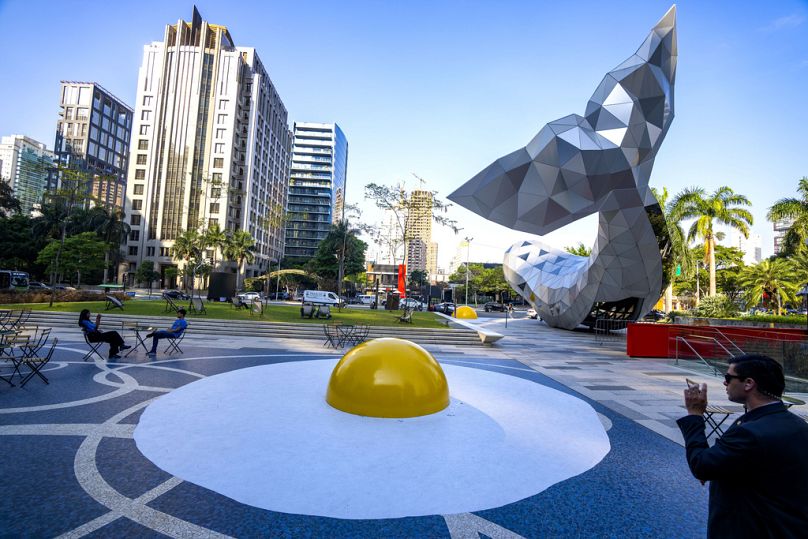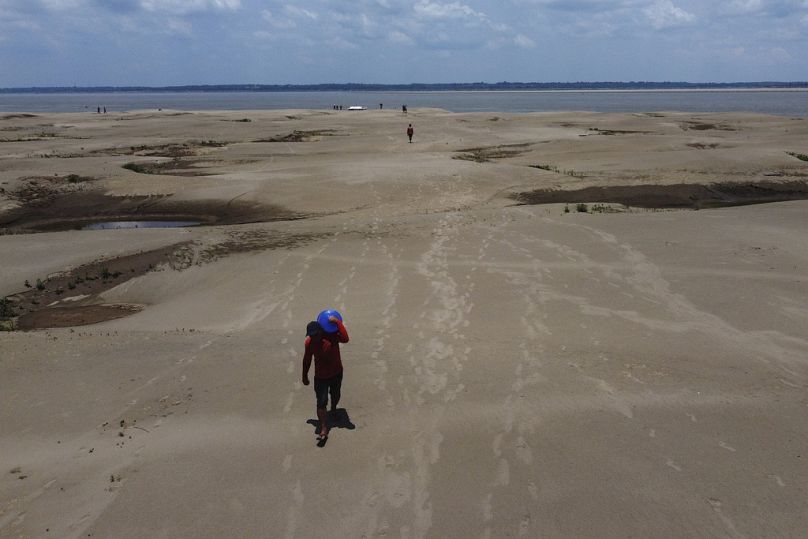The road to COP30 demands bold leadership that unites rather than divides and invites international cooperation. Brazil can deliver what we desperately need, May Boeve and Ilan Zugman write.
2023 was the hottest year on record.
Last year's monsoons in India have claimed the lives of more than 2000 people, South Korea and Japan saw unprecedented levels of flooding, widespread heat waves spread through Europe and Latin America, and wildfires raged through North America.
This should have been a wake-up call. Instead, oil and gas production continues to soar, and with it billions of dollars in profit for the fossil fuel industry.
This year, over a 12-month period, for the first time on record, global heating has exceeded temperatures of 1.5 degrees Celsius.
In 2015, 196 countries signed the Paris Climate Agreement saying that in order to limit the effects of climate change, we’d need to keep long-term warming to 1.5C above pre-industrial levels — before humans started burning large amounts of fossil fuels.
This first year-long breach in global temperatures doesn't break the landmark Paris Agreement but is a clear warning sign that we need to act fast.
Brazil's desire to lead by example needs to be highlighted
The good news is that for the first time ever, “transition away from fossil fuels” was included in the final outcome of the 2023 UN Climate Talks at COP28 in Dubai, as well as the goal of tripling renewable energy and doubling energy efficiency by 2030.
With this progress, there is a feeling of momentum in the air. The climate movement now needs to hold leaders and policymakers accountable to follow through on the agreements made.
Despite COP29 being hosted this year in Azerbaijan, it is actually Brazil that is starting to take the spotlight, as it is not only host to 2024's G20 but also COP30 in 2025.
COP30 needs to catalyze the kind of collective movement focus that spurs the political action we need.
Brazil is now one of the world's key democracies with a strong desire to lead on climate solutions and home to almost 60% of the Amazon.
Despite a complicated relationship with fossil fuels, environmental preservation and Indigenous rights, it is home to diverse social and environmental movements that have a track record of holding governments accountable and helping advance international climate negotiations.
In the past, Rio 92 gave rise to the United Nations Framework Convention on Climate Change — which then resulted in the Paris Climate Agreement in 2015 — the Convention on Biodiversity, as well as Agenda 21 and the Rio Declaration on Environment and Development.
Brazil has time and again assumed the identity of a nation that has the capacity and desire to lead by example, a challenge that today, as the world grapples with runaway climate chaos, is absolutely crucial.
And conditions are ripe for breakthroughs.
Take from the rich, give to the poor
This year, both at G20 meetings in Brazil and at COP29 in Azerbaijan, financing the renewable energy transition will be at the top of the agenda.
And this is something we can expect the Brazilian government, who never misses an opportunity to call on rich countries to pay for the energy transition and demand development bank reform, to make some noise around.
We need that loud voice right now because to power up renewable energy at scale, the critical missing piece is equitable financing.
While overall investment in renewables is increasing globally and should be celebrated, without a significant shift in how much money is flowing to these projects and reform of the mechanisms that facilitate this flow, the transition will not occur at the scale and speed necessary, nor will it be equitable.
Money needs to flow from rich countries that have polluted the world to lower-income countries whose communities are often at the forefront of climate chaos and left out of the energy transition.
In addition to that, in 2025 at COP30, countries must set ambitious targets and implementation plans that guarantee a fair and fast energy transition to renewable energies, such as solar and wind.
Let's build the bridges we need on a warming planet
Yet public trust that the COP process can deliver has been waning. That has a lot to do with where they were last hosted in 2022 (Egypt) and 2023 (UAE), and where it will be hosted this year in Azerbaijan.
With little to no freedom for public demonstrations and civil society expression, as well as record-breaking fossil fuel lobbyist attendance, having UN Climate Talks in such oppressive spaces makes it very difficult for movements to generate the necessary political conditions for ambition.
But we see a way forward. These are issues that a democracy and one known for strong social movements, like Brazil, can help fix.
COP30 can be the moment where the climate movement unites around the solutions we need and takes what it has learned from stopping coal plants and advocates for solar and wind power. Demanding the swift political action that we need on a warming planet.
Only together can we build the bridges we need — inside and out — to push for the ambitious outcomes the world and communities everywhere want.
The road to COP30 demands bold leadership that unites rather than divides and invites international cooperation. It calls for moments that inspire and lead the world to ambitious agreements that put us back on track.
With the support of movements, Brazil can deliver what we desperately need.
May Boeve is the Executive Director, and Ilan Zugman is the Latin America Managing Director at 350.org, a global movement rising up for bold climate action.
At Euronews, we believe all views matter. Contact us at view@euronews.com to send pitches or submissions and be part of the conversation.













